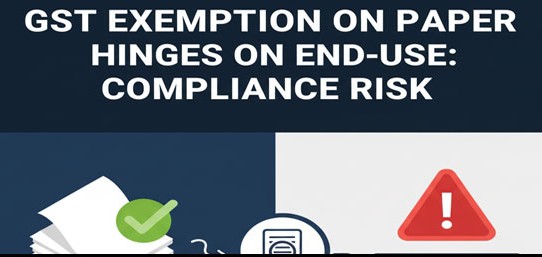The Indian paper industry cautions that recent GST reforms exempting uncoated paper imports from taxes could lead to a sharp rise in imports, undermining domestic manufacturers facing higher input costs. This trend threatens India’s Make in India initiative and risks increasing production costs for notebooks and textbooks
The Indian paper industry has voiced serious concerns regarding the recent Goods and Services Tax (GST) reforms, warning that these changes may trigger a significant surge in paper imports. The reforms have exempted uncoated paper used for exercise books and notebooks from GST, leading to zero Integrated GST (IGST) on such imports.
Pawan Agarwal, President of the Indian Paper Manufacturers Association (IPMA), highlighted the risk of India becoming a dumping ground for cheaper imported paper, which would disrupt the competitiveness of domestically produced paper. While local manufacturers are grappling with rising input costs, imported paper now enters India tax-free under the GST amendments, creating distorted market conditions.
Data shows that paper imports have nearly doubled in volume over the past four years, growing at a compound annual growth rate (CAGR) of over 17%. Imports reached 2.06 million tonnes in FY25, valued at ₹15,000 crore, nearly doubling from 1.08 million tonnes in FY21.
The GST exemption results in domestic manufacturers losing input tax credit (ITC) on the final product, causing embedded taxes in production costs. Consequently, domestic notebook producers face a steep increase in production costs—estimated at 35% for notebooks and over 6% for printed textbooks. This situation may ultimately burden the education sector and students.
Important Points:
Recent GST reforms exempt uncoated paper imports used in notebooks and exercise books from GST and IGST, making imports tax-free.
Indian Paper Manufacturers Association warns this may flood the market with cheaper foreign paper, harming local producers.
Paper imports into India have doubled in four years, with a CAGR above 17%, one of the fastest-growing commodity imports.
Domestic manufacturers lose input tax credit on exempted products, increasing their cost burden sharply.
Production costs for notebooks rise by 35%, and printed textbooks over 6%, impacting the education sector and consumers.
The surge in imports contradicts the Indian government’s Make in India initiative aimed at boosting domestic manufacturing.
Major Takeaway:
While the GST reforms aim to simplify tax structures and reduce costs, the unintended consequence may be a surge in paper imports that could weaken India's domestic paper manufacturing sector, create market imbalances, and increase costs for critical educational supplies, necessitating urgent policy attention.
Sources: The Hindu Business Line, Business Standard, Economic Times, Indian Paper Manufacturers Association (IPMA), PrintWeek.

